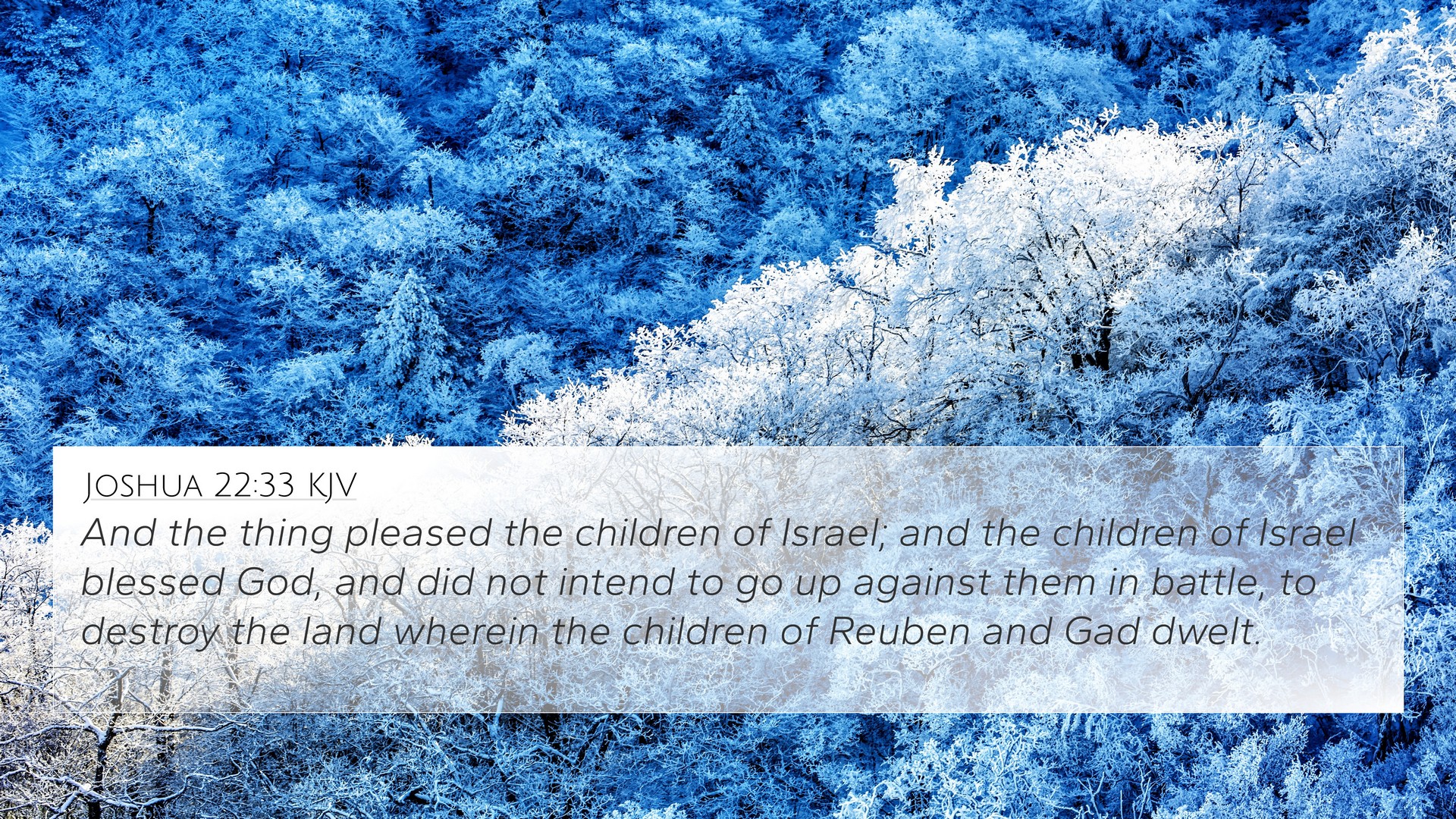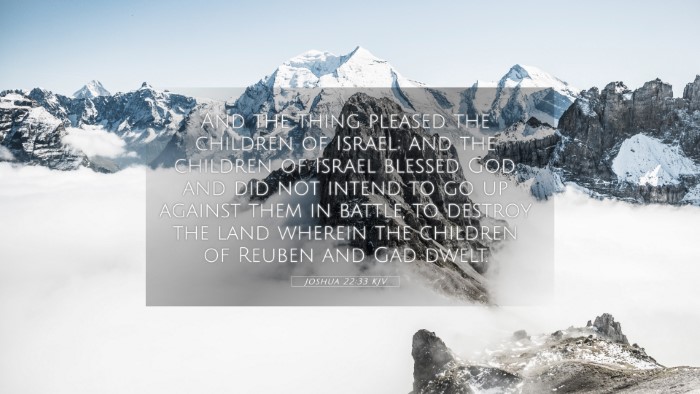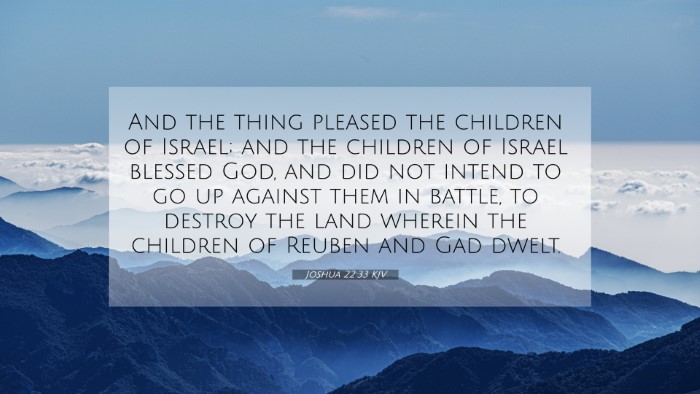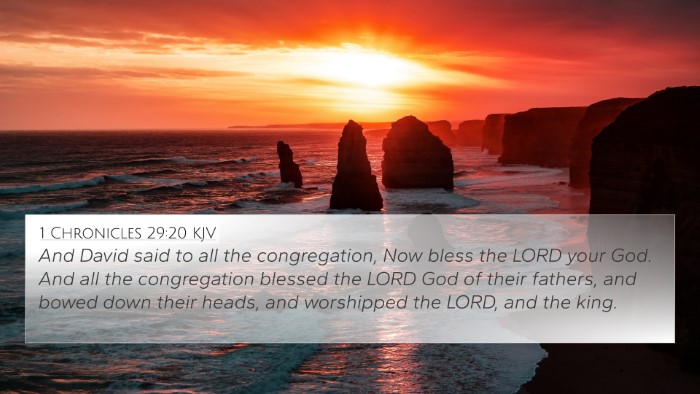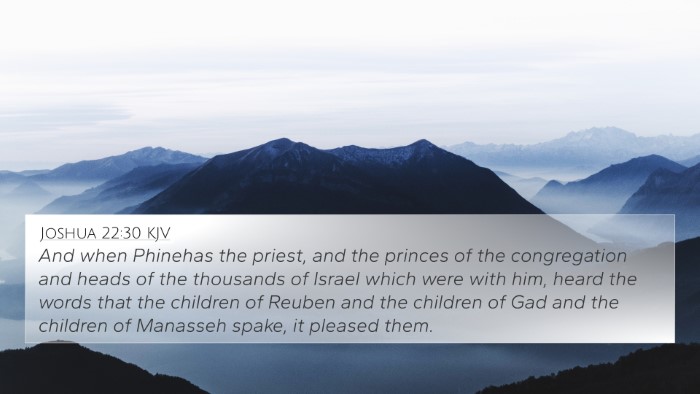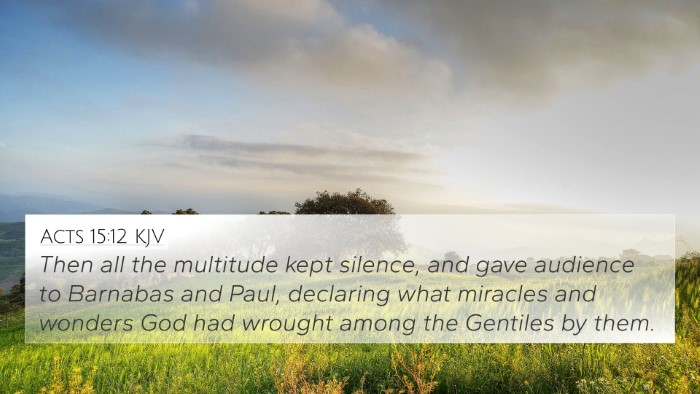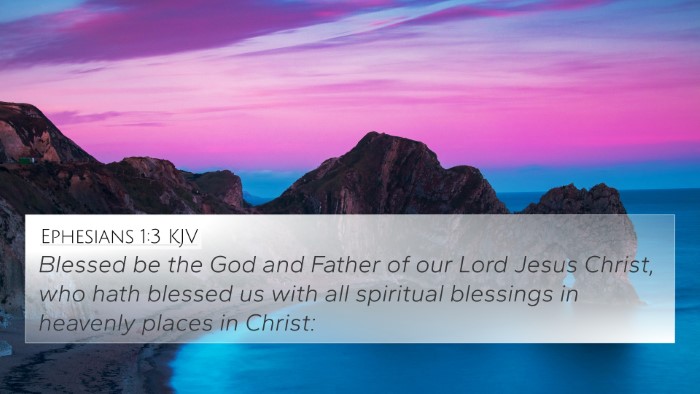Understanding Joshua 22:33
Joshua 22:33 reads: "And the thing pleased the children of Israel; and they blessed God, and did not intend to go up against them in battle, to destroy the land wherein the children of Reuben and Gad dwelt." This verse comes at a critical juncture where the tribes of Israel have addressed concerns regarding the actions of the tribes of Reuben and Gad, who settled on the east side of the Jordan River.
Summary of Meaning
This verse encapsulates themes of community, unity, and the importance of communication within the body of believers. Despite initial misunderstandings, the leaders and people of Israel sought to maintain peace and uphold God's intentions for their shared inheritance.
Insights from Commentaries
Matthew Henry's Commentary
Henry emphasizes the idea that the tribes of Reuben and Gad had significant reasons for their choice of settlement, rooted in practical considerations concerning livestock. The response of the Israelites reflects a willingness to engage in dialogue rather than conflict, showing a collective commitment to preserve harmony among the tribes.
Albert Barnes' Commentary
Barnes points out that this verse highlights the importance of public sentiment and the role of leadership in guiding communities according to God’s commands. The collective blessing of God indicates the approval of their decision to refrain from war, indicating that discord is dispelled through mutual respect and communication.
Adam Clarke's Commentary
Clarke offers an insightful analysis of the cultural and social dynamics at play. He argues that the blessing given to God reinforces the notion that gratitude and acknowledgement of divine providence prevail in the hearts of the Israelites as they recognize their familial bonds and shared faith.
Connections to Other Bible Verses
This verse connects with several other biblical texts that emphasize themes of unity, God’s purpose, and the importance of peace within communities. Below is a list of related verses:
- Psalm 133:1 - "Behold, how good and how pleasant it is for brethren to dwell together in unity!"
- Matthew 5:9 - "Blessed are the peacemakers: for they shall be called the children of God."
- 1 Corinthians 1:10 - "Now I beseech you, brethren, by the name of our Lord Jesus Christ, that ye all speak the same thing, and that there be no divisions among you."
- Ephesians 4:3 - "Endeavouring to keep the unity of the Spirit in the bond of peace."
- Romans 14:19 - "Let us therefore follow after the things which make for peace, and things wherewith one may edify another."
- Philippians 2:2 - "Fulfil ye my joy, that ye be likeminded, having the same love, being of one accord, of one mind."
- Matthew 18:20 - "For where two or three are gathered together in my name, there am I in the midst of them."
- James 3:18 - "And the fruit of righteousness is sown in peace of them that make peace."
- Colossians 3:14 - "And above all these things put on charity, which is the bond of perfectness."
- Romans 12:18 - "If it be possible, as much as lieth in you, live peaceably with all men."
Thematic Connections and Cross-Referencing
Joshua 22:33 invites readers to explore the broader themes of unity, divinely-guided leadership, and the necessity of dialogue among believers. Such themes resonate through various scripture passages, encouraging a holistic understanding of the message God conveys through His word.
Principles Derived from Cross-Referencing
Utilizing tools for Bible cross-referencing can enhance our study of scripture, particularly when examining the relationships between verses. Here are some principles on how to leverage cross-references effectively:
- Identify Context: Begin with the immediate context of the verse and look for theological or narrative connections to other texts.
- Analyze Thematic Links: Categorize verses based on themes like unity, peace, and God’s faithfulness.
- Utilize Bible Concordances: Use concordances to find similar words or phrases that may point to corresponding teachings or events.
- Engage in Comparative Analysis: Analyze verses side-by-side to discover deeper meanings or insights into God’s plans.
- Make Use of Cross-Reference Guides: These tools can provide quick connections between not just the Old and New Testament, but also within the same genre of scripture.
Conclusion
Joshua 22:33 encapsulates fundamental aspects of the communal life of Israel and the broader themes of peace and understanding within the scriptures. By employing a comprehensive Bible cross-reference system—including engaging with significant themes and communal principles—we can enhance our understanding and application of biblical teachings.
Further Study Suggestions
For individuals seeking to deepen their understanding of Joshua 22:33 and its connections, consider:
- Conducting a detailed study of Old Testament tribal narratives and their implications for New Testament teachings.
- Exploring comparative studies of Pauline epistles, especially those that address unity in the body of Christ.
- Engaging with resources on inter-Biblical dialogue to strengthen the understanding of scripture as a cohesive narrative.
- Utilizing biblical chain reference materials to trace the effects of unity and conflict across different books of the Bible.
